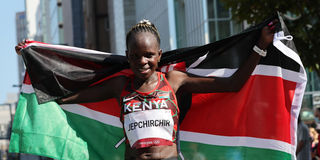Long journey towards gender equality in sports

Kenya's Peres Jepchirchir celebrates after winning the women's marathon final during the Tokyo 2020 Olympic Games in Sapporo on August 7, 2021.
What you need to know:
- For the first time since Kenya’s first Olympic participation in Melbourne 1956, Tokyo 2020 was the first Games where the women’s quota in the team dramatically surpassed that of men at 56 per cent representation
- The number of Kenyan women winning Olympic medals has also risen progressively, from the first and only medal in 1996, by Pauline Konga in 5,000 metres to more than half the Kenyan medals in Rio 2016 – seven of 13 medals and sharing 50-50 in Tokyo 2020
- It is apparent that women are emerging from the shadows of men in sports, and it has been through a long history of deliberate efforts of support and role modelling
When Andrew Amonde and Mercy Moim entered the Tokyo Olympic Stadium during the Tokyo 2020 Olympic Games Opening Ceremony as joint flag bearers of Kenya, it sent a strong message of equality and a reflection of just how far women in sports have come.
And that is not all. For the first time since Kenya’s first Olympic participation in Melbourne 1956, Tokyo 2020 was the first Games where the women’s quota in the team dramatically surpassed that of men at 56 per cent representation.
Going back in history, in 1956, Kenya was represented by just one female athlete, Margaret Northrop in swimming. The trend continued of about five per cent and below for women representation until the 2000s. Sydney 2000 posted a significant improvement by women participants at 39 per cent.
The number of Kenyan women winning Olympic medals has also risen progressively, from the first and only medal in 1996, by Pauline Konga in 5,000 metres to more than half the Kenyan medals in Rio 2016 – seven of 13 medals and sharing 50-50 in Tokyo 2020.
A similar trend has been reflected in the Commonwealth Games. Birmingham 2022 had an almost 50-50 representation with joint male and female flag bearers, represented by sprinter Ferdinand Omanyala and para-powerlifter Hellen Wawira, also sending a message of equality and inclusivity.
It is apparent that women are emerging from the shadows of men in sports, and it has been through a long history of deliberate efforts of support and role modelling.
When Pamela Jelimo won the first Olympic gold for Kenya at Beijing 2008, the country’s female athletes were inspired by the possibility of being at the very top.
National Olympic Committee of Kenya (NOC-K) has not lost this focus of creating gender parity in sports. NOC-K is working towards breaking social, structural and organisational barriers to participation of women in sports.
This will be done through equitable allocation of resources to teams. Towards Tokyo 2020, two female teams were put on scholarships that enabled them prepare, qualify and represent the nation at the Games. The same is being replicated in the preparations for Paris 2024 Olympics. The Basketball 3x3 women’s teams and the volleyball women’s team are under scholarship to support their preparations and qualification.
NOC-K has also put in place policies to ensure adequate representation in leadership positions at the Games. Federations are required to have gender equal management, monitored closely by the Board.
Inadequate representation in leadership is perhaps the biggest issue in sports, and NOC-K has created trainings, and other forums to build the capacity of women leaders. This includes the monthly “Step Up” series, women only sports administrators courses and advanced courses, and equal distribution of management and coaching scholarships.
As we celebrate International Women’s Day, we will continue to embrace gender equity. We invite all our stakeholders to do the same.
Mutuku is the Secretary General at the National Olympic Committee of Kenya.





